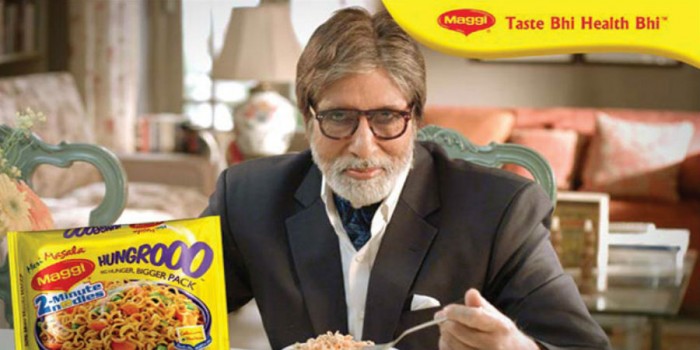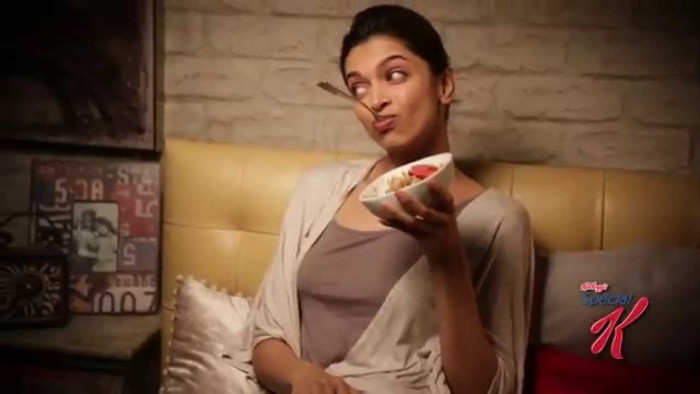Opinion: Why can’t celebs just stop endorsing ‘unhealthy’ food products, huh?
So, Maggi’s in hot water and threatens to drag its celebrity endorsers down with it. Fans of Amitabh Bachchan and Madhuri Dixit are crying ‘unfair’ on social media and filmdom is clearly displeased, too. The talking heads on prime-time TV have also been saying, ‘Why blame the stars? What are the authorities doing?’
Still, unless you are a Bollywood star hoping for a big brand endorsement or are star-struck to such a degree rational thinking is hampered, you’d have to agree that these celebrities had a role in selling Maggi which is now under the scanner. The thing is, it’s all arranged so that they’ll never have to pay the price for promoting foods that are proven to contain unacceptable levels of MSG and lead or colas with so many sweetening agents they are harmful to children. ‘Celebrities are protected by their contracts,’ Indranil Das Blah of celebrity and sports management firm Kwan has said in the wake of the Maggi controversy. ‘You cannot hold a celebrity responsible or liable for something that’s not in their hands, they are not in charge of the product development in the first place. They are not going to get into the R&D of a product or the brand promises that it makes.’

However, Amitabh Bachchan, speaking about his contract with Maggi – which is over now — said in an interview that he is at pains to find out if everything’s okay with the products he endorses. Who does he check this with? With Nestle, makers of Maggi. In the same interview he said he’d insisted that Nestle should defend him in the event of a controversy such as this one. Madhuri Dixit, meanwhile, took to social media to tweet ‘Like most of India, I have enjoyed Maggi noodles for years. I was very concerned after recent reports and met with the Nestle team.’
Clearly, the real issue here, the glamourised marketing of products that are, at best, junk food, even if their harmful effects are debatable, has become hijacked by the less important question of whether the film stars are accountable in this particular case.
Should, in the first place, these stars, worshipped as demi-gods and whose spiel is gospel to millions, be promoting instant noodles — which are little more than starch and flavouring agents — as nutrient-enhanced meals that all of India loves? Amitabh Bachchan has played no small role in boosting the sales of Maggi noodles in the country. All those happy rural children, those gully cricketers, those ruddy-faced little monks in Ladakh should, instead, be eating real food – fruit, vegetables, rotis, ragi porridge, idlis.

Should young women be bombarded by images of Deepika Padukone with her washboard abs exhorting them to eat Kellogg’s K for two weeks? Dieticians have pointed out that it is a temporary solution and lacks balanced nutrition. But the ad doesn’t tell you that. Food activist Bruce Breadly went as far as to write, ‘Rather than advocate eating more real foods, Kellogg’s has merely taken out their processed food toolbox to profit off the global obesity epidemic they helped to create.’
Then there are the Bollywood stars, the flavours of the season, promoting colas, despite their documented harmful effects. Researchers at the Rudd Center for Food Policy and Obesity at Yale University who studied 100 professional athletes and their endorsement contracts (for aerated drinks) said that ‘One reason any campaign wants a popular celebrity spokesperson is because kids are attracted to them no matter what they are doing. We can’t expect kids to turn off that admiration when the same person is selling sugar. At best, kids might be confused. At worst, they’ll think the messages about soda are the same as the messages about water, and those two beverages aren’t the same.’ Surely, Amitabh Bachchan and Madhuri Dixit didn’t believe they were selling stuff that was good for children?
China came up with a solution of a sort last year. The Central Party’s advertisement law was amended to say that celebrities who are paid to be spokespeople for products should try the product before they represent it. The law was prompted by false endorsements proving to be a problem there, just as it is in India. Jackie Chan, for instance, got into trouble after endorsing an anti-hair loss herbal shampoos which was found to contain a substance that may cause cancer. Jackie Chan’s response was petulant, rather than responsible: ‘I have always been very careful with what products I endorse. But there are some media who are specifically gunning for me and a few other artistes, I am not sure why, as though it is better that we all just died.’
No, Jackie Chan and all the Bollywood stars who endorse spurious products, no one wants you to die. Just don’t sell this stuff, that’s all. Surely, you can’t be that badly in need of the money. Kangana Ranaut turned down a fairness cream ad for good reasons only recently. Aamir Khan says he’ll only do socially relevant ads. Two of the South’s biggest stars, Kamal Haasan and Rajinikanth, have never endorsed products. So, why can’t Bollywood’s in-demand brand ambassadors show a little concern for what our children eat?
Disclaimer: The opinions expressed in this article are the author’s own and do not reflect the views of Folomojo.com

OMG-inducing, share-compelling, like-attracting, clutter-breaking, thought-provoking, myth-busting content from the country’s leading content curators. read on...
